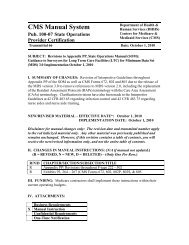LOUISIANA Community Mental Health Services Block Grant ...
LOUISIANA Community Mental Health Services Block Grant ...
LOUISIANA Community Mental Health Services Block Grant ...
Create successful ePaper yourself
Turn your PDF publications into a flip-book with our unique Google optimized e-Paper software.
prior to community residency. This time frame allowed adequate time for patients to apply for<br />
benefits needed for community residency for their physical and behavioral health needs as well as<br />
housing and specialty service needs. <strong>Community</strong> specialty services funded by the Department of<br />
<strong>Health</strong> and Hospitals (DHH) included Assertive <strong>Community</strong> Treatment, Intensive Case Management,<br />
and Therapeutic Residential Housing vouchers. OBH collaborates with several offices in order to<br />
facilitate the transition from the hospital into the community. These offices include the:<br />
Office of Medicaid -to facilitate access to benefits for patients exiting the intermediate<br />
hospitals.<br />
Office of Vital Records -to secure birth certificates as source documents to facilitate access to<br />
housing programs and other entitlements.<br />
Office for Citizens with Developmental Disorders (OCDD) -to identify those patients who<br />
meet the criteria for community services provided by programs within that office.<br />
The strategic COC process provided a framework for the successful discharge of patients to the<br />
community. The Office of Behavioral <strong>Health</strong> COC plan includes a method of tracking discharged<br />
clients for a follow up period of nine months to ensure successful discharge.<br />
Through the <strong>Mental</strong> <strong>Health</strong> Redesign initiative, OBH is also developing and evaluating alternate<br />
strategies and different service systems to support the forensic patient population in intermediate<br />
care. Currently, the office provides forensic services to 235 individuals in the Feliciana Forensic<br />
Facility that is affiliated with East Louisiana <strong>Mental</strong> <strong>Health</strong> System (ELMHS). As in other states, the<br />
local court systems and the ever expanding population of forensic patients often place significant<br />
pressures on state inpatient services. In fact, as this population expands and local judges often<br />
control individuals‟ discharges, the forensic inpatient population comes to occupy aspects of the civil<br />
hospital system. As a component of the <strong>Mental</strong> <strong>Health</strong> Redesign initiative, the Office of Behavioral<br />
<strong>Health</strong> is creating alternative levels of care for a portion of the forensic inpatient population.<br />
Increased capacity is being built in community-based forensic aftercare programming and Forensic<br />
Assertive <strong>Community</strong> Treatment teams. Different levels of residential care, known as Secure<br />
Forensic Facilities, are being developed for those individuals, who have reached some degree of<br />
clinical stability and no longer require hospital-levels of care, but may not be eligible for release<br />
through the courts.<br />
In the event of crisis, hospitalization is a last resort, after community alternatives are tried and/or<br />
ruled out prior to inpatient hospitalization in a state inpatient facility. Implementation of the<br />
statewide Continuity of Care policy continues to enhance joint hospital-community collaboration<br />
with the goals of improved outcomes post-discharge including reduced recidivism. They also address<br />
the problems of acute and long term care; specifically assessing existing capacities and shortages<br />
coupled with delivering appropriate acute care services.<br />
Another avenue of care that has succeeded in reducing hospitalization rates is the <strong>Mental</strong> <strong>Health</strong><br />
Rehabilitation (MHR) program. MHR allows greater flexibility of services; and the ability to cover<br />
additional services such as ACT and MST, which are consumer driven and recovery-focused. The<br />
previously discussed move of the MHR program into the DHH Medicaid Office should improve the<br />
availability of resources and flexibility to an even greater extent. Each OMH Region/ LGE also has<br />
specific initiatives aimed at reducing hospitalization and/or shortening hospital stays.<br />
Utilization of state hospital beds dropped significantly with the introduction of community-based<br />
<strong>Mental</strong> <strong>Health</strong> Rehabilitation (MHR) services and the development of brief stay psychiatric acute<br />
PART C <strong>LOUISIANA</strong> FY 2011 PAGE 122<br />
SECTION III: ADULT PLAN – CRITERION 1<br />
COMPREHENSIVE COMMUNITY-BASED MENTAL HEALTH SERVICES -- SYSTEM OF CARE & AVAILABLE SERVICES
















